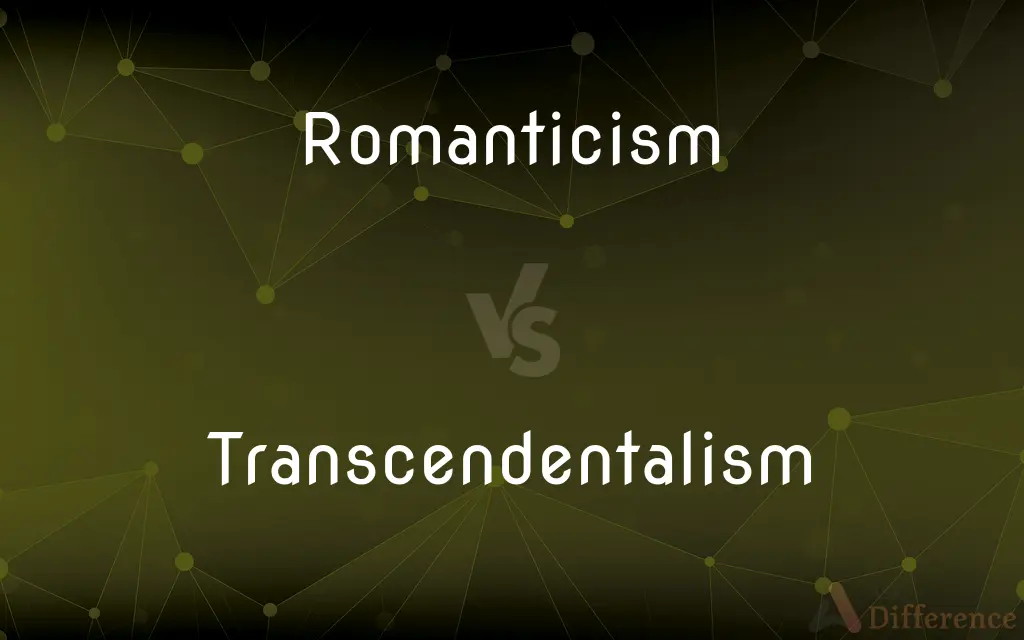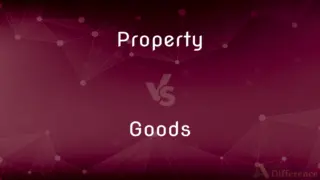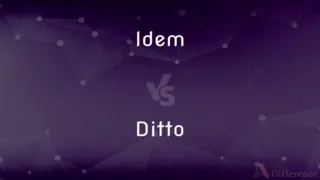Romanticism vs. Transcendentalism — What's the Difference?
By Tayyaba Rehman — Updated on October 27, 2023
Romanticism emphasizes emotion and imagination, often celebrating nature and individualism. Transcendentalism, a subset, focuses on spirituality, intuition, and the inherent goodness of people and nature.

Difference Between Romanticism and Transcendentalism
Table of Contents
ADVERTISEMENT
Key Differences
Romanticism, originating in Europe in the late 18th century, emphasized emotion, imagination, and individualism, reacting against the Industrial Revolution's rationality. In contrast, Transcendentalism, mainly an American movement in the early 19th century, emphasized spirituality, self-reliance, and the inherent goodness of both people and nature.
While Romanticism celebrated nature's beauty and power, often as a source of inspiration and emotional experience, Transcendentalism saw nature as a pathway to spiritual and personal growth. Transcendentalists believed in transcending the physical world to achieve a higher spiritual state.
Romanticism valued creativity and artistic expression, with literature, poetry, and art focusing on emotion and the sublime. Transcendentalism, while sharing these values, also incorporated philosophical and religious elements, emphasizing intuition over empirical evidence.
Key figures in Romanticism include poets like William Wordsworth and artists like Caspar David Friedrich. Transcendentalism’s notable figures include Ralph Waldo Emerson and Henry David Thoreau, who intertwined philosophy, nature, and social commentary.
Romanticism's influence spanned across Europe, affecting various forms of art and literature. Transcendentalism, while primarily an American movement, influenced social reforms and had lasting impacts on American literature and thought.
ADVERTISEMENT
Comparison Chart
Origin and Time
Late 18th century, Europe.
Early 19th century, America.
Focus
Emotion, imagination, individualism.
Spirituality, intuition, inherent goodness.
Nature’s Role
Source of inspiration and emotional experience.
Pathway to spiritual growth.
Artistic Expression
Valued in literature, poetry, and art.
Philosophical, religious, and social elements.
Key Figures
Wordsworth, Friedrich.
Emerson, Thoreau.
Compare with Definitions
Romanticism
Response to the Industrial Revolution's rationality.
Romanticism offered a contrast to the era's industrialization.
Transcendentalism
Focuses on spirituality and intuition.
Transcendentalism influenced his philosophical writings.
Romanticism
Emphasizes emotion and imagination.
Romanticism influenced his poetry profoundly.
Transcendentalism
Influenced various social reform movements.
Transcendentalism's principles were seen in his social activism.
Romanticism
Highlights the beauty and power of nature.
The painting's Romanticism was evident in its vivid landscapes.
Transcendentalism
Views nature as a means to spiritual growth.
His essays on nature showed Transcendentalism's influence.
Romanticism
Focuses on personal feelings and experiences.
Her novel's Romanticism was seen in its complex characters.
Transcendentalism
Originated in early 19th-century America.
Transcendentalism played a significant role in American thought.
Romanticism
Impacted various art forms.
Romanticism's impact is evident in 19th-century music.
Transcendentalism
Transcendentalism is a philosophical movement that developed in the late 1820s and 1830s in the eastern United States. A core belief is in the inherent goodness of people and nature, and while society and its institutions have corrupted the purity of the individual, people are at their best when truly "self-reliant" and independent.
Romanticism
Romanticism (also known as the Romantic era) was an artistic, literary, musical, and intellectual movement that originated in Europe towards the end of the 18th century, and in most areas was at its peak in the approximate period from 1800 to 1850. Romanticism was characterized by its emphasis on emotion and individualism as well as glorification of all the past and nature, preferring the medieval rather than the classical.
Transcendentalism
Often Transcendentalism A literary and philosophical movement arising in 19th-century New England, associated with Ralph Waldo Emerson and Margaret Fuller and asserting the existence of an ideal spiritual reality that transcends empirical and scientific reality and is knowable through intuition.
Romanticism
Often Romanticism An artistic and intellectual movement originating in Europe in the late 1700s and characterized by a heightened interest in nature, emphasis on the individual's expression of emotion and imagination, departure from the attitudes and forms of classicism, and rebellion against established social rules and conventions.
Transcendentalism
The quality or state of being transcendental.
Romanticism
Romantic quality or spirit in thought, expression, or action.
Transcendentalism
The transcending, or going beyond, empiricism, and ascertaining a priori the fundamental principles of human knowledge.
Romanticism
A romantic quality, spirit or action.
Transcendentalism
Ambitious and imaginative vagueness in thought, imagery, or diction.
Romanticism
A fondness for romantic characteristics or peculiarities; specifically, in modern literature, an aiming at romantic effects; - applied to the productions of a school of writers who sought to revive certain medi val forms and methods in opposition to the so-called classical style.
He [Lessing] may be said to have begun the revolt from pseudo-classicism in poetry, and to have been thus unconsciously the founder of romanticism.
Transcendentalism
A philosophy which holds that reasoning is key to understanding reality (associated with Kant); philosophy which stresses intuition and spirituality (associated with Ralph Waldo Emerson); transcendental character or quality.
Romanticism
Impractical romantic ideals and attitudes
Transcendentalism
A movement of writers and philosophers in New England in the 19th century who were loosely bound together by adherence to an idealistic system of thought based on a belief in the essential supremacy of insight over logic and experience for the revelation of the deepest truths.
Romanticism
A movement in literature and art during the late 18th and early 19th centuries that celebrated nature rather than civilization;
Romanticism valued imagination and emotion over rationality
Transcendentalism
The transcending, or going beyond, empiricism, and ascertaining a priori the fundamental principles of human knowledge.
Romanticism
An exciting and mysterious quality (as of a heroic time or adventure)
Transcendentalism
Ambitious and imaginative vagueness in thought, imagery, or diction.
Transcendentalism
Any system of philosophy emphasizing the intuitive and spiritual above the empirical and material
Transcendentalism
Advocates for individual intuition and self-reliance.
Her life choices were deeply rooted in Transcendentalism.
Common Curiosities
What is the main focus of Romanticism?
Romanticism focuses on emotion, imagination, and individualism.
How did Transcendentalism view nature?
Transcendentalism saw nature as a means to spiritual and personal growth.
Did Romanticism influence music?
Yes, Romanticism significantly influenced 19th-century music.
What was Romanticism a reaction to?
It was a reaction to the rationalism of the Industrial Revolution.
Is Transcendentalism a religious movement?
It has spiritual elements but is more philosophical than religious.
Can Romanticism be found in visual arts?
Absolutely, Romanticism greatly impacted painting and visual arts.
What's the difference in the origin of Romanticism and Transcendentalism?
Romanticism originated in Europe, while Transcendentalism was an American movement.
Can Transcendentalism be linked to any notable figures?
Yes, Ralph Waldo Emerson and Henry David Thoreau are key figures.
Were social reforms part of Transcendentalism?
Yes, it influenced various social reform movements.
Did Transcendentalism affect American literature?
Yes, it had a lasting impact on American literature and thought.
Are there common themes between Romanticism and Transcendentalism?
Yes, both value nature and individual experience, though in different ways.
Who are some notable figures in Romanticism?
William Wordsworth and Caspar David Friedrich, among others.
Was Romanticism only a literary movement?
No, it encompassed literature, art, music, and philosophy.
Did Romanticism value creativity?
Yes, it highly valued creativity and artistic expression.
Did Transcendentalists believe in intuition over reason?
Yes, they valued intuition and self-reliance over empirical evidence.
Share Your Discovery

Previous Comparison
Property vs. Goods
Next Comparison
Idem vs. DittoAuthor Spotlight
Written by
Tayyaba RehmanTayyaba Rehman is a distinguished writer, currently serving as a primary contributor to askdifference.com. As a researcher in semantics and etymology, Tayyaba's passion for the complexity of languages and their distinctions has found a perfect home on the platform. Tayyaba delves into the intricacies of language, distinguishing between commonly confused words and phrases, thereby providing clarity for readers worldwide.













































